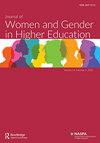“You Are Seen; You Matter:” Applying the Theory of Gendered Organizations to Equity and Inclusion for Motherscholars in Higher Education
Q2 Social Sciences
Journal of Women and Gender in Higher Education
Pub Date : 2022-01-02
DOI:10.1080/26379112.2022.2025816
引用次数: 3
Abstract
This international study examined how to support equity and inclusion for 18 mothers in academia (“motherscholars”). Applying Acker’s theory of gendered organizations as a framework for the study, we recruited participants from Facebook groups for women and mothers in higher education across disciplines and nine countries. To attend to the needs of participants, we employed principles of rigid flexibility, such as adjusting data collection to allow for texting as a form of interviewing. Thematic analysis coupled with researcher arts-based sketches led to identifying critical supports and obstacles for motherscholars, including mentoring and financial opportunities, institutional resources for families, open communication about families, and experiences of bias and isolation. Recommendations for practice, policy, and further research are included.“你被看见了;你很重要:“将性别组织理论应用于高等教育中母亲学者的公平和包容”
这项国际研究考察了如何支持学术界18位母亲(“母亲学者”)的公平和包容。应用阿克尔的性别组织理论作为研究框架,我们从脸书上跨学科、跨九个国家的高等教育女性和母亲小组中招募了参与者。为了满足参与者的需求,我们采用了严格灵活的原则,例如调整数据收集,将短信作为一种面试形式。主题分析与研究人员基于艺术的草图相结合,为母亲学者确定了关键的支持和障碍,包括辅导和经济机会、家庭的机构资源、关于家庭的公开交流以及偏见和孤立的经历。包括对实践、政策和进一步研究的建议。
本文章由计算机程序翻译,如有差异,请以英文原文为准。
求助全文
约1分钟内获得全文
求助全文
来源期刊

Journal of Women and Gender in Higher Education
Social Sciences-Gender Studies
CiteScore
1.40
自引率
0.00%
发文量
20
 求助内容:
求助内容: 应助结果提醒方式:
应助结果提醒方式:


